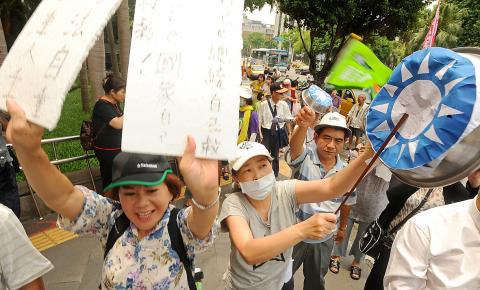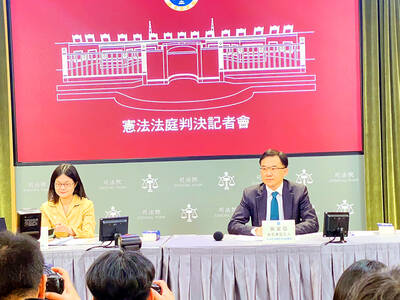A group made up of 26 civic organizations yesterday sued the Supreme Prosecutors’ Office Special Investigation Panel (SIP), accusing it of forging documents, subornation of perjury and abuse of judicial power.
Led by Taiwanese National Party (TNP) Chairman Huang Hua (黃華), the groups filed the lawsuit with the Taipei District Court against the SIP, which they said cut a deal with former -Chinatrust -Financial Holding Co (中信金控) vice chairman Jeffrey Koo Jr (辜仲諒) to testify against former president Chen Shui-bian (陳水扁) in an attempt to imprison him.
Koo, who was involved in a scandal over Chinatrust’s bid for rival Mega Financial Holdings Co (兆豐金控) — known as the Red Fire Case (紅火案), after the name of the offshore company used to conduct the illegal transaction — returned to Taiwan in 2008 after evading an arrest warrant and hiding in Japan for two years.

Photo: Liu Hsin-de, Taipei Times
The banker testified at the time that he had donated about NT$300 million (US$10.4 million) of his illegal profits to Chen, currently serving a 17-and-a-half-year term for corruption and money laundering, as a kickback.
Koo’s lawyers told the Taiwan High Court in May that Koo did not remit the money to Chen, adding that he testified out of fear of being detained upon his return to Taiwan.
Koo was released on bail after returning from Japan and was sentenced to nine years in prison in October last year.
The SIP, including former prosecutor Yueh Fang-ju (越方如) who flew to Japan to persuade Koo to return, is suspected of coercing Koo to commit perjury, Huang said.
Despite the SIP’s conclusion on July 4 that no prosecutor had abused his power in the Chen case, the civic groups decided to file the lawsuit in the interest of upholding social justice and human rights, he said.
The groups also said former president Lee Teng-hui’s (李登輝) recent indictment on charges of embezzling state funds was a “similar act of oppression against Taiwanese.”
The Lee and Chen cases were both acts of “political oppression,” Huang said.
Dozens of members of the groups chanted slogans calling for “judicial reform” and saying “Taiwanese are innocent” in front of the court.
They also urged the establishment of a jury system.

TRAGEDY STRIKES TAIPEI: The suspect died after falling off a building after he threw smoke grenades into Taipei Main Station and went on a killing spree in Zhongshan A 27-year-old suspect allegedly threw smoke grenades in Taipei Main Station and then proceeded to Zhongshan MRT Station in a random killing spree that resulted in the death of the suspect and two other civilians, and seven injured, including one in critical condition, as of press time last night. The suspect, identified as a man surnamed Chang Wen (張文), allegedly began the attack at Taipei Main Station, the Taipei Fire Department said, adding that it received a report at 5:24pm that smoke grenades had been thrown in the station. One man in his 50s was rushed to hospital after a cardiac arrest

PUBLIC SAFETY: The premier said that security would be tightened in transport hubs, while President Lai commended the public for their bravery The government is to deploy more police, including rapid response units, in crowded public areas to ensure a swift response to any threats, President William Lai (賴清德) said yesterday after a knife attack killed three people and injured 11 in Taipei the previous day. Lai made the remarks following a briefing by the National Police Agency on the progress of the investigation, saying that the attack underscored the importance of cooperation in public security between the central and local governments. The attack unfolded in the early evening on Friday around Taipei Main Station’s M7 exit and later near the Taipei MRT’s Zhongshan

ON ALERT: Taiwan’s partners would issue warnings if China attempted to use Interpol to target Taiwanese, and the global body has mechanisms to prevent it, an official said China has stationed two to four people specializing in Taiwan affairs at its embassies in several democratic countries to monitor and harass Taiwanese, actions that the host nations would not tolerate, National Security Bureau (NSB) Director-General Tsai Ming-yen (蔡明彥) said yesterday. Tsai made the comments at a meeting of the legislature’s Foreign Affairs and National Defense Committee, which asked him and Minister of National Defense Wellington Koo (顧立雄) to report on potential conflicts in the Taiwan Strait and military preparedness. Democratic Progressive Party (DPP) Legislator Michelle Lin (林楚茵) expressed concern that Beijing has posted personnel from China’s Taiwan Affairs Office to its

‘ILLEGAL RULING’: The KMT and the TPP slammed the Constitutional Court judgement, saying it contravened the law and was trying to clear the way for a ‘green dictatorship’ The Constitutional Court yesterday ruled that amendments to the Constitutional Court Procedure Act (憲法訴訟法) passed by the Legislative Yuan last year are unconstitutional, as they contravene due legislative process and separation of powers. The Legislative Yuan on Dec. 20 last year passed amendments stipulating that no fewer than 10 grand justices must take part in deliberations of the Constitutional Court, and at least nine grand justices must agree to declare a law unconstitutional. The Executive Yuan on Jan. 2 requested that lawmakers reconsider the bill, but the Legislative Yuan, under a combined majority of Chinese Nationalist Party (KMT) and Taiwan People’s Party